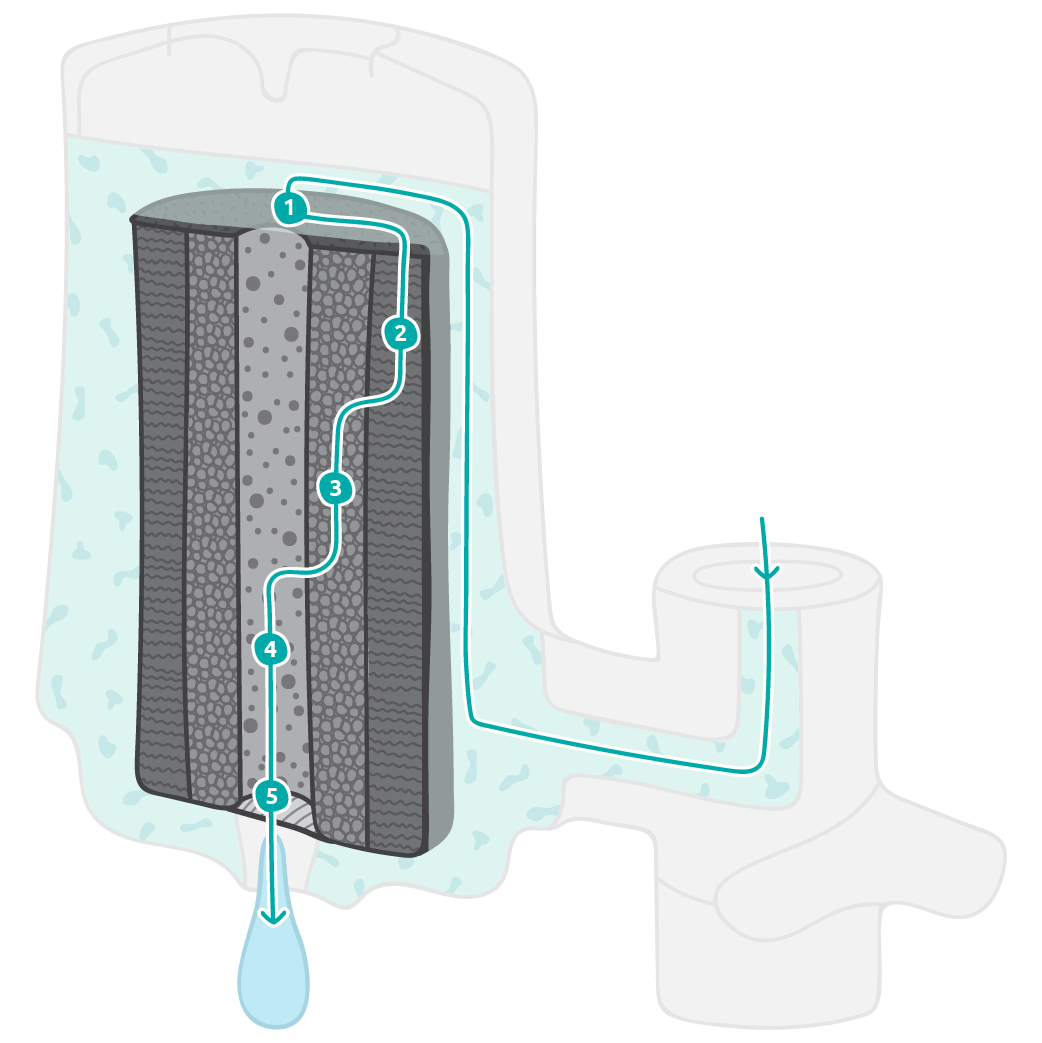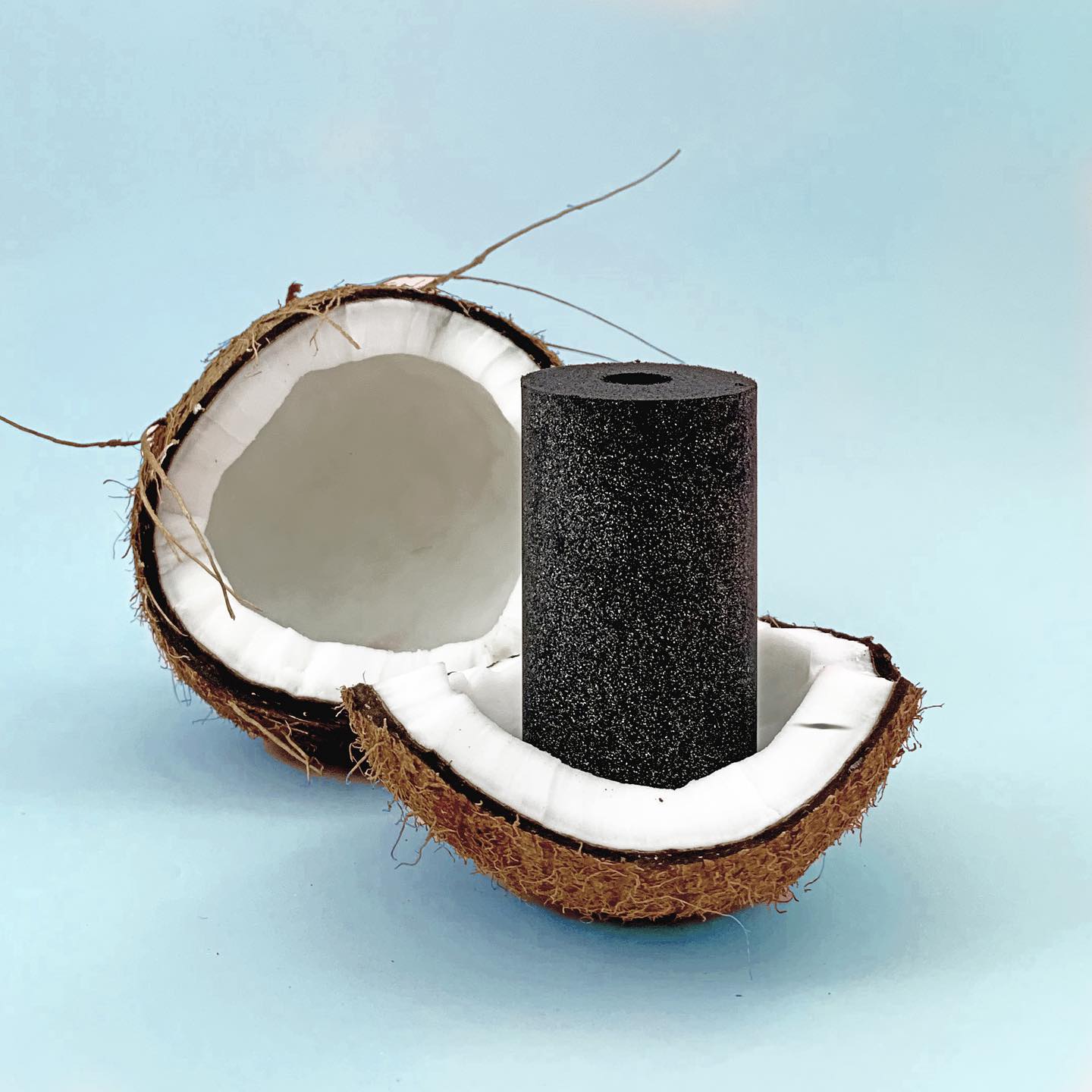
How do our filters work?
Our refills filter more than 100 substances from tap water, even particles of 1-2 microns are retained in the carbon block.
In addition, it preserves the essential minerals of the source water.
It is pure science, since the technology we use is advanced microfiltration in 5 stages:
5 stage advanced micro-filtration
Polypropylene mesh
It surrounds the carbon block and filters out larger microorganisms, sediment, rust, scale particles and other impurities.
It also protects the carbon block from being contaminated by human hands when it is changed.
Activated carbon adsorption
Activated carbon made from coconut shells removes organic chemical material, chlorine, chlorine by-products (VOC, THM, HAAS, etc.), taste, odor, pesticides, herbicides, PFAS and more than 80 contaminants. It also reduces heavy metals like lead, copper, mercury, and more.
Carbon block micro-filtration
The carbon block filters particles larger than 1 to 2 microns.This prevents microplastics, suspended particles, and most bacteria from passing through the filter.It also prevents corrosion particles and bacteria that build up in the pipes from seeping out.
Limescale and heavy metal inhibitor
Our patented formula, which we are very proud of because it is the fruit of years of research, is found inside the carbon block.
It breaks down the ore to prevent lime from forming, in addition to fulfilling its second function, which is to retain the remaining heavy metals.
Wire mesh
Filter hair, sand, dirt and other impurities that may be present in the pipes of your building.
Subscribe to our newsletter
15% Discount code immediately available to you when you subscribe
What does TAPP Water filter?
-
Chlorine & Chloramine
Filtering chlorine elimintaes the bad taste and smell from your tap water.
-
Limescale
Inhibiting the lime means no more calcified kettles, coffee machines and gives you cleaner glasses , utensils and refillable bottles.
-
Heavy metals
It is natural that there are traces of lead, zinc, manganese or copper in the water, among others such as barium, due to the corrosion of the pipes through which the water circulates.
-
Microplastics
Of increasing concern are plastic micro-particles are becoming more present in our environment.
-
Chlorine by products
Present in public water supplies due to the chlorination process over 100 different by-products have been studied and shown to be harmful to health.
-
Pesticides, herbicides, nitrates & nitrites
Leaching into water supplies from a variety of sources including agriculture all these substances are filtered.
-
Pharmaceuticals
Drugs have been found in tap water at very low concentrations.For example, active ingredients such as atenolol, carbamazepine, estrone, meprobamate and trimethoprim have been found.
-
Bacteria
Most harmful bacteria, such as E. coli, or microbial cysts, such as Giardia, Cryptosporidium, Entamoeba, Giardia, Cryptosporidium, Salmonella and Legionella
-
PFAS
These substances also include PFOA, PFOS and PFNA.They are sometimes called “forever chemicals”.

Made from coconut
Our coconut derived activated carbon filters contain micro-pores which are less than 2 nanometers (nanometer=1 billionth of a meter=very, very, very small).
The coconut shell used in the process mean these carbon blocks will have a high surface area with a large number of micro-pores, exactly what we look for in a top quality water filter for use with a kitchen tap.
The carbon blocks themselves give up very little dust as they are very hard and the material used is a green, renewable, harvest-able material.
Driven by technology
-
Independently tested
Independent test resultsLaboratory tested and certified to filter over 100 contaminants from your tap water.
-
Sustainable
The TAPP Water StoryDesigned with sustainability at our core, our water filters constantly evolve to reduce the amount of plastic used.
-
Great taste guaranteed
The TAPP great taste guaranteeAll our products come with our special 45 day full refund guarantee. A full refund if you are unsatisfied and we collect your purchase too.
See how easy it is to fit a TAPP EcoPro
TAPP Water filters
-
EcoPro Compact
Regular price From €49,00 EURRegular price -
ShowerPro Diamond
Regular price From €49,00 EURRegular price




